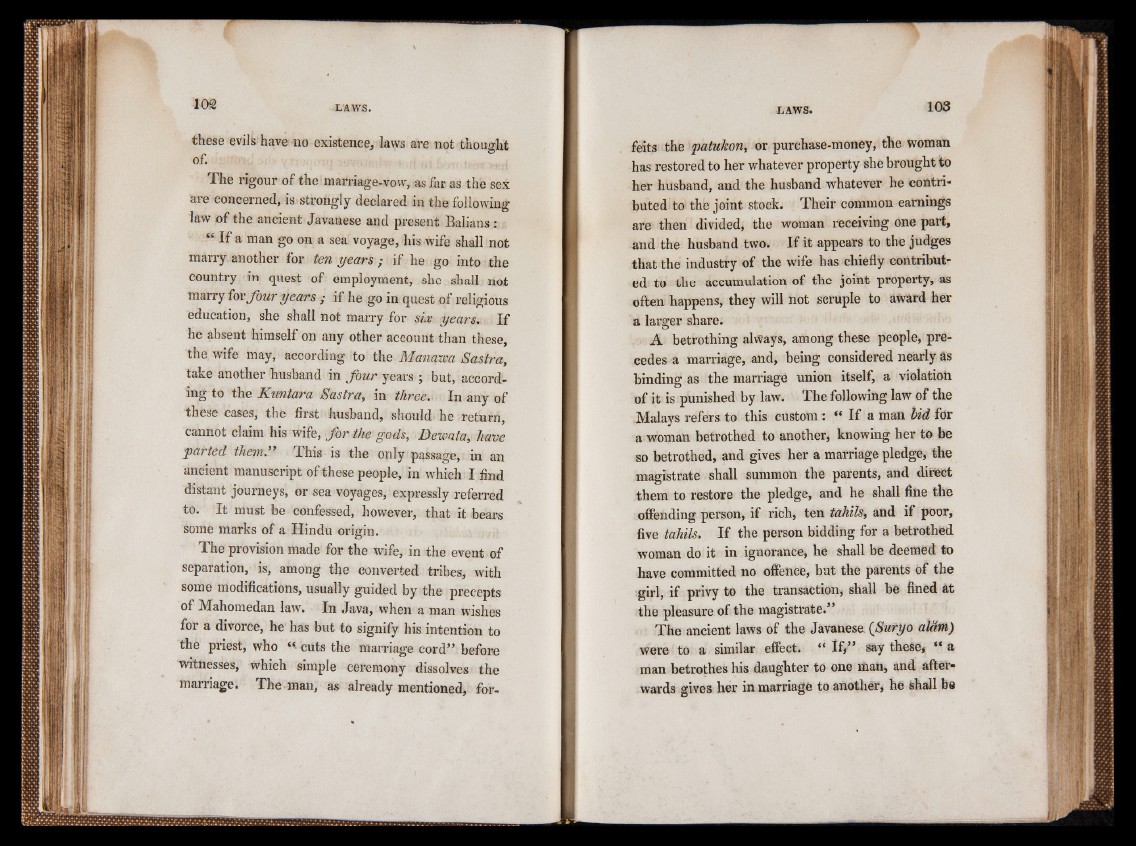
these evils have no existence* laws are not thought
of.
.The rigour of the marriage-vow, as far as the sex
are concerned, is strongly declared in the following
law of the ancient Javanese and present Bahans ;
“ If a man go on a sea voyage, his wife shall not
marry another for ten years ; if he go into the
country in quest of employment, she shall not
marry for Jour years ; if he go in quest of religious
education, she shall not marry for six years. If
he absent himself on any other account than these,
the wife may, according to the Manawa Sastra,
take another husband in Jour years ; but, according
to the Kuntara Sastra, in three. In any of
these cases, the first husband, should he return,
cannot claim his wife, for the gods, Dewata, have
parted them. This is the only passage, m an
ancient manuscript of these people, in which I find
distant journeys, or sea voyages, expressly referred
to. It must be confessed, however, that it bears
some marks of a Hindu oriogin. The provision made for the wife, in the event of
separation, is, among the converted tribes, with
some modifications, usually guided by the precepts
of Mahomedan law. In Java, when a man wishes
for a divorce, he has but to signify his intention to
the priest, who H cuts the marriage cord” before
witnesses, which simple ceremony dissolves the
marriage. The man, as already mentioned, forfeits
the patulcon, or purchase-money, the woman
has restored to her whatever property she brought to
her husband, and the husband whatever he contributed
to the joint stock. Their common earnings
are then divided, the woman receiving one part,
and the husband two. If it appears to the judges
that the industry of the wife has chiefly contributed
to the accumulation of the joint property, as
often happens, they will not scruple to award her
a larger share;
A betrothing always, among these people, precedes
a marriage, and, being considered nearly as
binding as the marriage union itself, a violation
of it is punished by law. The following law of the
Malays refers to this custom: “ If a man bid for
a woman betrothed to another, knowing her to be
so betrothed, and gives her a marriage pledge, the
magistrate shall summon the parents, and direct
them to restore the pledge, and he shall fine the
offending person, if rich, ten tahils, and if poor,
five tahils. If the person bidding for a betrothed
woman do it in ignorance, he shall be deemed to
have committed no offence, but the parents of the
girl, if privy to the transaction, shall be fined at
the pleasure of the magistrate.”
The ancient laws of the Javanese (Suryo aldm)
were to a similar effect. “ If,” say these, “ a
man betrothes his daughter to one man, and afterwards
gives her in marriage to another, he shall be